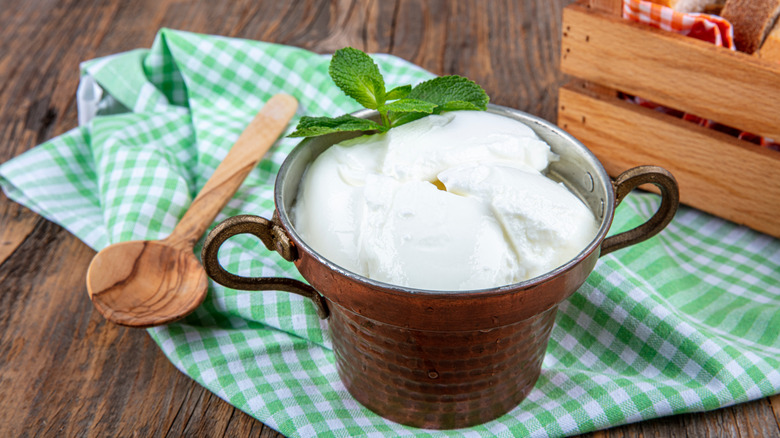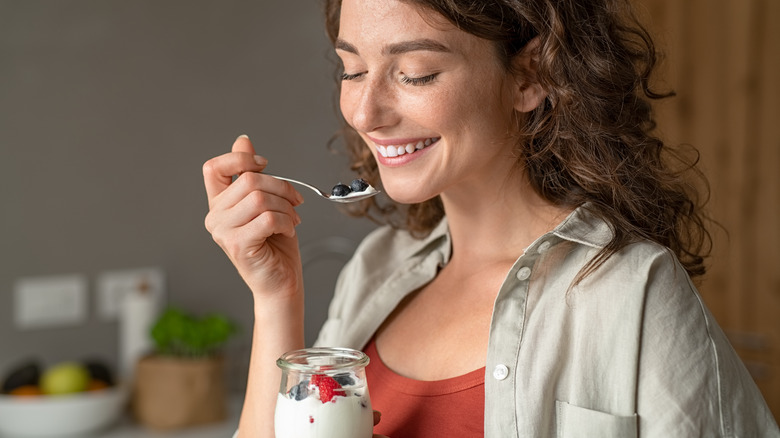A Benefit Of Eating Yogurt That Might Surprise You
Loaded with protein, yogurt is a popular choice for gym-goers and dieters alike. You can mix it into smoothies and salads, use it in baked goods, or enjoy it as-is. What you may not know is that yogurt boasts large doses of potassium, phosphorus, and vitamin B12. Plus, it easily fits into most diets. A 3.5-ounce serving has just 63 calories, 1.6 grams of fat, 7 grams of carbs, and over 5 grams of protein, reports My Food Data. Greek yogurt is even more nutritious, offering a whopping 10 grams of protein per 3.5 ounces.
Most types of yogurt also contain probiotics that promote gut health. "Yogurt is the fermented food produced by culturing cream, milk, or both with a characterizing bacterial culture that contains lactic acid-producing bacteria," explained registered dietician Maya Feller in an interview with Well + Good. To be sure, check if the label says "living cultures" or "contains active cultures."
Unlike other milk products, yogurt is relatively safe for those with lactose intolerance. "Yogurt bacteria contain high levels of the lactase enzyme, and this enzyme acts in the intestine to help digest the lactose. So eating yogurt is like taking a digestive enzyme supplement," says Dennis Savaiano, a professor of nutrition science at Purdue University (via the Yogurt in Nutrition Initiative). This snack also supports immune function and keeps your bones strong.
Yogurt has one other health benefit that might surprise you — and no, we're not talking about its role in weight loss or muscle growth.
Yogurt may benefit your skin and hair
Worried about wrinkles and fine lines? Forget about expensive creams and add more yogurt to your diet! This delicious treat may slow down aging and boost skin health. Protein, one of its key nutrients, supports tissue renewal and repair. When consumed in adequate amounts, it also enhances cellular protein synthesis and speeds up wound healing (via Nutrients).
An earlier study published in the American Journal of Clinical Nutrition found that women with wrinkled skin had lower intakes of protein, vitamin A, vitamin C, potassium, phosphorus, and other nutrients than those with a youthful appearance. The scientists noted that low-protein diets increase skin fragility in older adults. Yogurt also contains B-complex vitamins, which may help reduce signs of aging and improve skin appearance, states Medical News Today. For example, vitamin B5 fights skin inflammation, while vitamin B3 can minimize the appearance of age spots.
Protein is an integral component of every cell and tissue in your body. Therefore, yogurt and other high-protein foods may benefit your hair and nails, too. A diet low in this nutrient can lead to hair loss, according to research published in Dermatology Practical and Conceptual. In the right amounts, zinc, niacin, selenium, and other nutrients are just as important for healthy hair — and you can get them from yogurt. This creamy snack won't take years off your face, but it can improve your complexion and keep your skin young for longer when consumed as part of a balanced diet.


